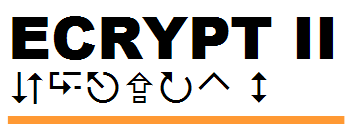NaCl: Networking and Cryptography library

Computer Aided Cryptography Engineering

ECRYPT II
NaCl: Networking and Cryptography library |
 Computer Aided Cryptography Engineering |
 ECRYPT II |
|
Hashing: crypto_hashC++ interfaceC++ NaCl provides a crypto_hash function callable as follows:
#include "crypto_hash.h"
std::string m;
std::string h;
h = crypto_hash(m);
The crypto_hash function hashes a message m. It returns a hash h. The output length h.size() is always crypto_hash_BYTES.
C interfaceC NaCl provides a crypto_hash function callable as follows:
#include "crypto_hash.h"
const unsigned char m[...]; unsigned long long mlen;
unsigned char h[crypto_hash_BYTES];
crypto_hash(h,m,mlen);
The crypto_hash function hashes a message m[0], m[1], ..., m[mlen-1]. It puts the hash into h[0], h[1], ..., h[crypto_hash_BYTES-1]. It then returns 0.
Security modelThe crypto_hash function is designed to be usable as a strong component of DSA, RSA-PSS, key derivation, hash-based message-authentication codes, hash-based ciphers, and various other common applications. "Strong" means that the security of these applications, when instantiated with crypto_hash, is the same as the security of the applications against generic attacks. In particular, the crypto_hash function is designed to make finding collisions difficult.See Validation regarding safe message lengths. Selected primitivecrypto_hash is currently an implementation of SHA-512.There has been considerable degradation of public confidence in the security conjectures for many hash functions, including SHA-512. However, for the moment, there do not appear to be alternatives that inspire satisfactory levels of confidence. One can hope that NIST's SHA-3 competition will improve the situation.
Alternate primitivesNaCl supports the following hash functions:
VersionThis is version 2019.03.19 of the hash.html web page. |